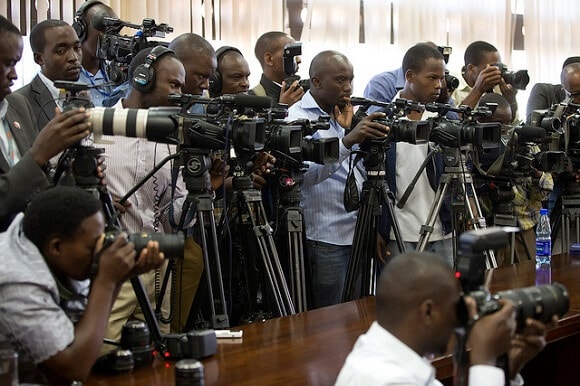Opinion: Attacks on media freedom go against the free society doctrine

Threatening to switch off TV stations and cancel broadcasting licences over live coverage of protests wasn't just heavy-handed but a blatant attempt at censorship that flies in the face of our constitutional guarantees.
The current wave of protests has exposed a very concerning trend in Kenya: a concerted attack on press freedom that goes right to the core of our democracy.
Not only is there an attempt to steer the narrative, but there is also a concerted campaign to suppress the fourth estate, which goes against the fundamental tenets of a free society as well as our constitution.
More To Read
- Outcry as Communications Authority proposes DNA rule for SIM registration
- Telecom operators ordered to adopt approved digital certificates by January 2026
- MPs grill Government Advertising Agency over Sh9 million weekly MyGov deal
- DStv loses 80 per cent of Kenyan subscribers in one year as price hikes bite
- Kenya to benefit from EU’s Sh2.3 billion internet expansion project
- Millennials edge out Gen Z in internet use – CA study
Let's begin with the startling letter that Communications Authority of Kenya Director-General David Mugonyi sent a few weeks ago. Threatening to switch off TV stations and cancel broadcasting licences over live coverage of protests wasn't just heavy-handed but a blatant attempt at censorship that flies in the face of our constitutional guarantees. That action was blatantly autocratic and had no place in a nation that takes great pride in being the leader of democracy in East Africa.
However, the dangers don't end with institutions. They've become quite intimate. Not only is the shooting and injuring of a K24 TV journalist during live coverage of a protest in Nakuru an attack on one reporter but also an attack on the journalism profession as a whole and the public's right to know.
Weeks after the incident, no police officer has been charged, which is concerning given the importance of protecting the lives and well-being of journalists.
The recent kidnapping of seasoned journalist Macharia Gaitho and his eventual release after public uproar is even more concerning. The Directorate of Criminal Investigations' "mistaken identity" assertion was hardly credible. These kinds of events foster a climate of fear and intimidation, which encourages journalists to practice self-censorship, a harmful kind of press repression.
Particularly concerning are President Ruto's recent remarks condemning the media for "siding" with the demonstrators he referred to as "anarchists" and urging "responsible" reporting. This talk establishes a hazardous tone, coming from the nation's highest office.
Instead of portraying honest, on-the-ground reporting as the vital public service that it is, it paints it as some kind of seditious conduct. According to the president's remarks, "responsible" media entails following the government's lead, which goes against the idea of a free.
When protests start, the media's role is not to soothe the government. Its goals are to provide all sides with a voice, depict what's happening, and aid the public in comprehending the context of the events. The administration is trying to delegitimise critical coverage and create a false dichotomy where journalists must choose between being truthful and being "patriotic" by portraying genuine reporting as "collaboration" with demonstrators.
There is an obvious and present threat to Kenya's democracy in this concerted pressure on the media, ranging from threats of regulations to acts of physical violence to derogatory remarks.
A free press is neither a luxury nor a privilege; rather, it is an essential means of citizen information, a crucial check on power, and the foundation of every well-functioning democracy.
The acts of the government point to a basic misinterpretation of the media's function in a democracy. Repression of news does not solve issues; instead, it pushes dissent underground, where it can fester and become more explosive. Even when it causes discomfort for people in authority, open and truthful reporting acts as a release valve for social pressure. It enables complaints to be spoken, comprehended, and possibly resolved before they become intense.
Attempting to control the narrative through traditional media is not only unethical but useless in the age of social media and citizen journalism. Information will find a way to go around, but in the absence of qualified journalists to check and analyse it, we run the possibility of a proliferation of false information that might become even more unstable.
This is a pivotal time for our democracy, and we must acknowledge it. All Kenyans must resolutely support our journalists in their defence of their right to a free and independent press, which also happens to be our right. Demanding accountability for attacks on journalists is crucial, as is responding forcefully to language that aims to diminish the media's vital role in our society.
To everyone in government, including the oversight organisations: back off this cliff. The fundamental problems that are causing protests cannot be resolved by threats, acts of violence, or intimidation against the media. Rather, they will only work to widen gaps, undermine confidence, and maybe intensify hostilities. Adopt open communication with the media, embrace transparency, and respect the fundamental rights outlined in the constitution that underpin our democracy.
Kenya needs more light, not less, in these turbulent times. Instead of fewer voices, we need more. The media must be allowed to carry out its duties without interference or fear. Only then can we hope to address the real issues facing our nation and build the just, transparent, and democratic society we all aspire to create.
The writer is a public policy specialist, development practitioner, and a management strategist. [email protected]
Top Stories Today















































